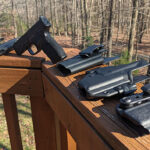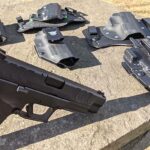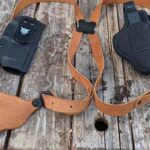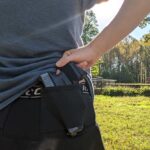How you choose a gun is a lot like finding the right car. There are so many choices that you have to do a lot of shopping around first. You have to know what your options are, what you’re looking for, and how to marry the two things together.
It may seem overwhelming, but it doesn’t have to be difficult. By following just a few simple tips, you’ll be able to choose the right gun for you out of all of the choices in the new and used market without all the stress.
Table of Contents
Factors for Choosing A Gun
Picking the right gun is about more than just what might look cool on your hip or what costs the least. It’s about more than just what’s popular right now or what everyone else thinks you should get.
So, what is important then? Here are some of the key factors you should consider before selecting the firearm that’s right for you.
- Purpose of your gun
- Firearm maintenance
- Firearm quality
- Grip and/or frame size
- Gun safety type
- Caliber & Recoil
- Accessories (e.g. holster, light, optics, etc.)
Purpose – What Do You Need From Your Gun?

The number one factor for determining the right firearm for you is how you intend to use it. Many beginners in the world of firearms think that all firearms have the same purpose, but that couldn’t be farther from the truth.
Yes, they all shoot, but for many different reasons. It’s a lot like asking, “What car should I get?” Well, it depends on where you’re going to use it, how you’re going to use it, and why you want it.
If you want to haul lumber, you should look into getting a pickup truck. If you want excellent fuel economy, try a hybrid vehicle. While they’re both good in their own right, they’re both terrible at doing each other’s jobs.
The same goes for firearms. If you want to hunt, a Remington 700 rifle would be great, whereas a Glock 19 is excellent for concealed carry or self defense. However, you’re not going to be able to use them interchangeably.
Maintenance

The next thing you’ll want to consider is how easy it is to maintain your firearm. Experienced gun owners may not mind some hefty maintenance. They know how to clean their guns, they’ve done it a lot of times before, and the thought of doing it again doesn’t intimidate them.
First time gun owners probably want something that’s relatively easy to take down and takes less time to clean. They’ll want the job to be seamless. The less they have to do it, the better. But even if it needs to be done frequently, it won’t take very long at all.
Gun Quality
As you might expect, quality is always important, but you don’t have to spend a fortune to get it. You’ll often get a quality firearm for a great price in the gun world. For example, exceeding $1000 for a defensive handgun is hardly ever worth it. $500 is a great target.
If you’re looking for quality, look for the names you know and trust. Here are just a few of the names you can rely on most of the time for quality, no matter what:
- Ruger
- Colt
- Smith and Wesson
- Sig Sauer
- Winchester
- Heckler and Koch
- Barrett
- Beretta
- Springfield
Grip size (or Handgun Size)
While a pocket revolver is a great option for a concealed carry firearm for most people, you still have to consider all of the options, especially if your hands are on the larger size. While you want to be able to conceal it, you also want feasible usability of your new gun.
If you have hands the size of Michael Jordan, you’re just not going to be able to grip a small handgun comfortably, nor get your sausage-sized finger over the trigger.
The same goes for the other extreme. You can’t purchase the largest gun you can find if you have small hands or a small frame. The firearm should be an extension of your person. It just needs to make sense and be comfortable.
Safety Type

There are a lot of different safety types, so it’s important to familiarize yourself with how these operate before you choose a firearm. Make sure you choose a gun with the type of safety you feel comfortable using.
Here are just some of the safety options from which you can choose:
- Grip safety
- Trigger safety
- Thumb safety
- Drop safety
While a safety is an important thing, you can’t rely on it as the primary source of gun safety. Always make sure you’re practicing firearm safety for the protection of yourself and those around you.
Caliber & Recoil

It’s a good rule of thumb to assume that the higher the caliber, the more recoil you’ll encounter. Consider how much recoil you can handle. Smaller people can’t handle as much, but it depends on your strength and your experience. That’s not always true.
More recoil can lead to injury if you don’t have the experience or you’re not prepared.
Higher caliber rounds generally cost more money, too, so make sure you know what you’re getting into as far as the cost of ammunition. It’s also important to make sure you know how to get reliable ammo.
Firearm Accessories

Choosing the best gun involves a bit more than just intuition. It also requires some foresight. You should analyze which accessories you might require for your gun to perform its duties effectively.
For instance, picking up a gun for concealed carry means you’ll also need a holster. Are there holsters available for the model you are planning to purchase? Similarly, if you plan to use optics or a flashlight for home defense, you’ll need a rail system to accommodate those attachments.
Depending on what you need from your firearm, your accessory choices will change. It’s important to think about this up front if possible to avoid buyers remorse later.
Importance Of Choosing The Right Gun
There are a number of reasons why choosing the right gun doesn’t just make sense, but it’s also crucial. If you choose a gun that you can’t handle, it becomes lethal for you and those around you. If it’s beyond your knowledge or capabilities, you put everyone in danger.
If the gun doesn’t fit you, you may be extending the limits of your comfort, which jeopardizes your aim and accuracy. Your overall experience with the gun won’t be good. Your general perception of the firearm will be that the quality is poor, when in fact it simply doesn’t fit you.
Purchasing the wrong gun for you can also mean valuable seconds between you and an intruder or an attacker. It can mean missing a target or that buck in your sights. You can’t overpower anything without the right combination of tools.
It’s a huge waste of time and money to buy a gun that doesn’t fit you, much like it would be pointless to buy a pair of shoes that doesn’t fit.
Jay Chambers
Contributor









